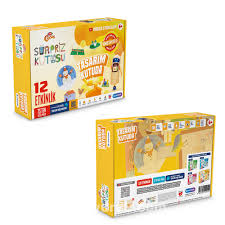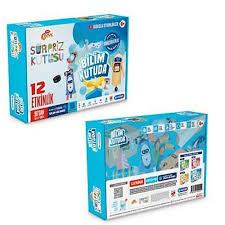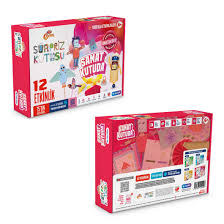‘’If You Know Me, You Love Me, If You Love Me, You Protect Me!’’: We talked with Merve Yıldızözü Çetin, the content producer of the Surprise Box play sets, about recycling and sustainability activiti
- Meryem Nur Serçe

- Jan 29
- 5 min read
Sustainability basically consists of 3 components: environmental, economic and social dimensions. Environmental sustainability aims to meet the needs of people without harming the ecosystem and natural resources. Recycling is an important element of environmental sustainability. Recycling means reprocessing and recovering used materials. In this way, the need for natural resources in the production of new products is reduced. Recycling for environmental sustainability not only protects natural resources but also saves energy.
So, how should we instill recycling and sustainability activities in children?
Merve Yıldızözü Çetin, a graduate of the Physics Department of Marmara University and working as the Content Development Director at Usturlab Education, believes that recycling and sustainability activities should be instilled in individuals of all ages, and together with the company she works for, they have aimed to guide in this regard with various workshops, games and books, and have taken important steps.

Recycling and sustainability are very sensitive issues. Although they are seen as adult habits, they are issues that need to be instilled from childhood. It is easier and more effective to instill things in children through games. We talked with content producer Merve Yıldızözü Çetin about how we should proceed and the importance of instilling at a young age. Please proceed by doing research on such issues.
1. What did you aim for when creating the Surprise Box game?
The Surprise Box activity kits have been developed in four different concepts for children aged 6 and above. The science, art, nature and design concept kits are the licensed product of the Surprise Box program broadcast on TRT Çocuk and received great attention. Our main goal while developing these kits was to raise recycling awareness in children in a fun and interactive way. We wanted to make the learning process more enjoyable with the fun “do-it-yourself” and video activities included in the game. We aimed to offer an experience that encourages children to acquire sustainable living habits at a young age.
2. What are your production stages?
Our production process started with idea development, activity development and concept designs. We watched all episodes of the Surprise Box program and categorized the activities with different concepts. We decided to produce four different kits with the themes of science, design, nature and art. We wanted the activities to not only teach recycling but also support the development of children's manual skills, fine motor development, imagination, problem solving, patience, environmental awareness, love of nature, savings and general culture. In this context, we worked with our content development, design and publishing teams to ensure that the kits were educational, fun and aesthetically stylish, affordable and accessible. Then, we collected feedback by conducting tests with children during the prototype phase. At the end of the production process, we used predominantly recyclable paper material in the kits and worked with local manufacturers to bring the game to life by acting with the principle of minimum waste.
3. To what extent did you pay attention to recycling in the production process?
We have placed great importance on recycling in our production process. We have tried to get the most out of our materials without wasting them by adjusting our product dimensions to avoid wasting any material as much as possible. We have been careful to use recyclable materials such as cardboard, paper, electronics, etc. We have also focused on minimizing waste in the packaging process.
4. Does this game have any benefits for sustainability, and if so, what are its benefits?
Yes, Surprise Box activity kits make significant contributions to sustainability. First of all, they help children understand the importance of recycling and upcycling and put them into practice in daily life. They support the creation of a sustainable living culture in society by spreading recycling and upcycling habits within the family.
5. How effective do you think it is to instill recycling through play in this day and age?
Teaching recycling and upcycling in a fun and practical way with a “do it yourself” concept activity kit allows children to learn through concrete experiences by getting away from the digital world. While digital materials usually offer a one-way interaction, such physical kits give children the opportunity to touch, combine, produce and directly observe the results. Creating something using their hands supports children’s problem-solving skills while developing their creativity.
In addition, physical activity kits help children develop their motor skills by taking them away from the screen and allow them to increase their social interactions by spending time with their family members. In this context, it is a method that parents will also prefer. Children who are motivated by instant feedback in the digital world experience being more patient and working process-oriented thanks to these kits. Therefore, physical activity kits that offer a fun and practical learning experience create a more permanent and effective awareness compared to digital materials.
6. What other ways can children be taught about recycling?
One of the most effective ways to instill recycling in children is through activities in nature. Our slogan in this context is “If you know it, you love it, if you love it, you protect it”. Therefore, in order for children to gain recycling awareness, they must first know nature, love it and then understand why they need to protect it. A child who does these things will already take the necessary steps to protect nature. Children need to spend a lot of time in nature, get to know nature and see humans as a part of nature.
7. Do you have any other activities for recycling?
Yes, we are also working on different projects on recycling. We recently designed and produced a board game called “Atıksızya”. With this game, we aimed to teach children about recycling processes and waste types through a fun board game.
In addition, our founder Sümeyye Ceylan is one of the authors of the book “Dünya Ortak Evimiz”. We develop different products and projects by collaborating with various institutions that want to raise awareness on recycling and sustainability.
In the context of nature activities that I mentioned in the previous question, we carry out practical exploration activities in nature for a wide age group from children to adults with Forest Explorers, which we have been carrying out since 2012 and is one of the pioneering projects in this field. We also support these activities with our Nature School project and offer learning opportunities in touch with nature. We believe that in order to raise awareness on recycling, the most fundamental thing to do is to know and respect nature.







Comments